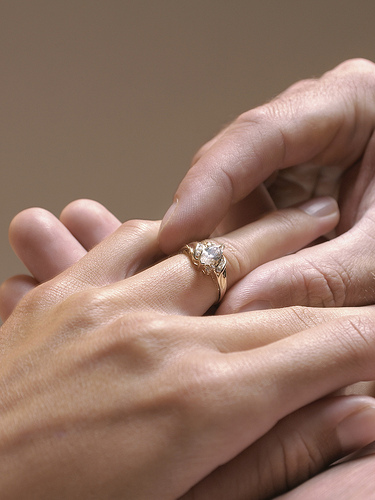
The tradition of “popping the question” hasn’t changed much through the years. Photo credit: State Farm, Flickr
I’ve had the same name my entire life. It was printed out on my birth certificate, right next to a stamp of my teeny tiny foot. Nothing changed when I got married, but ironically this lack of action threw some members of my family for a loop. During the holidays, when their confusion reaches its zenith, Christmas cards arrive in the mail addressed to “Peter Sager and Jessica Shugart,” Peter and Jessica Sager-Shugart,” “Peter and Jessica Sager,” and, my personal favorite, “Mr. and Mrs. Peter Sager.” Mrs. Peter Sager? Why not just write: “Peter Sager + wife?”
Even when the letters are addressed to me alone, most include some variation of a hyphenated surname, or lop my surname off all together. I don’t come from a highly traditional background, so this hullabaloo took me by surprise at first. I eventually just chalked it up to “things old folks worry about,” but a recent study at UC Santa Cruz showed that even among young students on one of the most liberal campuses in the country, traditional views on gender roles in the context of marriage are still alive and well.
In a study led by psychology graduate student Rachel Robnett and published in the Journal of Adolescent Research, researchers asked 277 undergraduate students at UC Santa Cruz how they felt about two marriage-related issues: proposals and surname changes. In regards to proposals, participants were asked, “If you were to be engaged, who would you want to propose?” Possible answers ranged from “I would definitely want to propose,” to “I would definitely want my partner to propose,” with less definitive answers in between.
The results showed that 66 percent of women would definitely want their partner to propose, and an additional 22 percent claimed they would “kind of” want him to pop the question. Nine percent were indifferent, 2.8 percent “kind of” wanted to propose, and a whopping zero percent of women said they would definitely want to propose.
The opposite was true for the men, none of whom had even the slightest desire for a partner-initiated proposal.
“I expected the general trends to be there, but I didn’t expect the traditional preferences to be so strong,” Robnett says of her results.
When asked about how willing they would be to take their partner’s surname, over 60 percent of women said they’d either be very willing or somewhat willing. For men, those numbers were essentially reversed.
Surprisingly, the students had no qualms about admitting they preferred traditional gender roles. Half of the participants invoked some form of “tradition” as their main reason for adhering to, well, tradition. About a quarter of women also claimed “romance” was a major reason for following the rules.
The survey also included questions that probed the students’ feelings about gender roles in society. By comparing the students’ answers to these broader questions, the authors were able to correlate adherence to traditional marriage values with “benevolent sexism.” As its name suggests, benevolent sexism is the “nice” kind of sexism, the kind that makes you feel all warm and fuzzy inside. When a man protects a woman, insists on paying for her dinner, or walks around the car to open her door, that’s benevolent sexism in action. To some, it may seem harmless, or even charming. But studies have shown that benevolent sexism rewards women who conform to traditional roles, in exchange for their personal autonomy.
Women were (and, in many parts of the world, still are) considered the property of their fathers and husbands, so marriage was essentially a business transaction, like a pink slip transfer, from one man to another. It would thus make sense for the man to ask the woman’s father for permission before proposing to her, and following the transaction, for the woman to exchange her father’s surname for her husband’s. Today, perhaps words like “owner” have been replaced with words of the benevolent persuasion, like “protector” or “provider.” As the results of Robnett’s study suggest, most people don’t seem to mind.
“A lot of the insidious things about these traditions have been left by the wayside as we’ve progressed,” says Robnett. “But I definitely think there are some problematic ideologies that continue to support these traditions.”
As far as my marriage proposal was concerned, the benevolence went both ways. We had a long heartfelt conversation, and decided to share our lives together. No one had to get down on the ground, no one had to answer yes or no on the spot. When I shared our undramatic story with friends and family, some of them were disappointed, or even seemed to feel sorry for me.
I certainly don’t harbor any ill will against women who dream of being swept off their feet with a romantic proposal, or long to have one cohesive family name. Who knows? Maybe one day I’ll spare everyone the hassle of Christmas card angst and tack on a –Sager to my last name. But for now, I still feel comfortable with my name as it’s always been.
That said, I certainly wouldn’t mind a box of fancy chocolates for Valentine’s Day.
